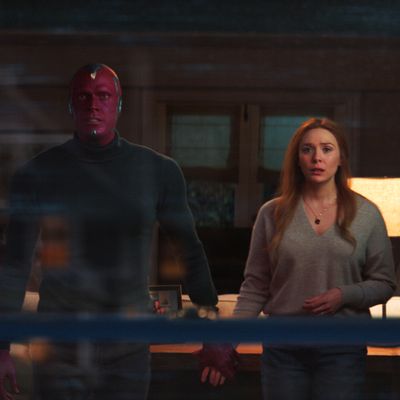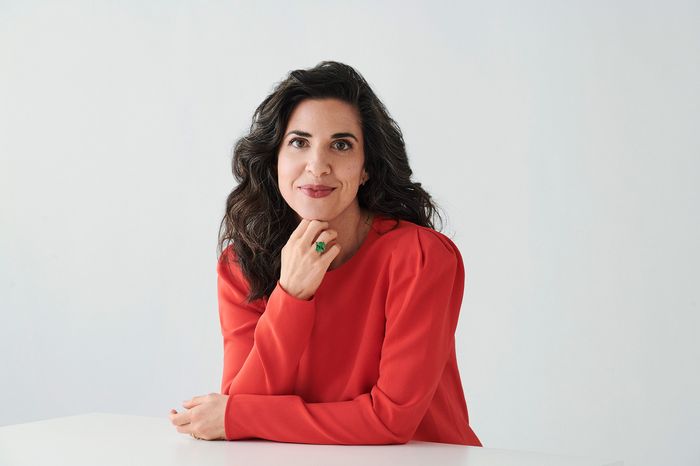
WandaVision, the Disney+ series that reestablished the lure of the Marvel franchise after the pandemic put it on pause, was always conceived as a hybrid. It was part superhero saga and part sitcom, part amusing nostalgia trip and part dramatic exploration of grief in a comic-book setting. So when Jac Schaeffer — a writer who has contributed to Marvel movie screenplays, including Captain Marvel and the upcoming Black Widow — took on the role of series showrunner, she approached it from a place of similar cross-pollination. She hired writers with experience in multiple genres, drew on influences from a variety of TV shows, and did the work of tying the story lines in the first Disney+ Marvel TV series directly into previous and future Marvel films, blurring one more pop-cultural line: the one between movies and television.
While Marvel critics, and, for that matter, even fans of the Marvel Cinematic Universe, may view the Marvel creative realm as something akin to a factory, given the amount of content™ it produces, Schaeffer describes the process of making WandaVision as collaborative and inspiring. “It was a crazy mash-up of everything that I love,” Schaeffer said during a recent phone call.
Following the series finale, Schaffer broke down for Vulture the ways in which her vision informed WandaVision.
Pitching WandaVision
The basic premise for WandaVision was conceived by Marvel chief creative officer and MCU mastermind Kevin Feige. He came up with the notion of using the series to explore Wanda Maximoff’s grief, and with having Wanda (Elizabeth Olsen) and her synthezoid love Vision (Paul Bettany) time-trip through classic sitcoms.
“They’d done some internal development on what that would look like and what it was to create the false reality,” Schaeffer says. “They downloaded that information to me, and I ruminated over all of it and essentially pitched what I thought for the season, breaking the episodes and what I saw as the essential arc of the show.”
The way WandaVision would tie into upcoming MCU futures had also been basically mapped out by Feige, but Schaeffer still had a lot of room to color in between the lines. One approach she considered, and later abandoned, was structuring the penultimate episode, in which Wanda flashes back to her childhood in Sokovia, as a riff on CSI.
“Once we had the writers’ room up and we were really closely examining what the episodes would be — and as you do in a writers’ room, everything is getting sharper and better and more fine-tuned — it became clear that the focus should be the family and family sitcom,” she says. “We wanted to be really daring in all of our influences and how we could consistently shatter the form in various ways, but it did require a measure of discipline in order for it not to fly off into outer space.”
Staffing the writers’ room
Schaeffer’s prior experience was primarily on the film side, and she had never been a showrunner before. But given the genre-fluid nature of WandaVision she wanted a mix of voices and POVs. Half the writers were men and half were women, but counting Schaeffer herself and producer Mary Livanos, she says the room was majority female. The balance of Marvel obsessives versus non-Marvel obsessives was also pretty evenly split.
“The writers in my room were all Marvel fans to varying degrees,” Schaeffer says. “Some people knew everything and leaned in that direction and others would be general TV fans and just wanted to make an excellent show.”
Since sitcoms were such a major part of the series, she sought out people with experience writing for those types of shows, as well as others.
“[I brought on] Bobak Esfarjani, who is a writer on Manifest,” she explains. “Mackenzie Dohr was a writer on both The Mindy Project and Locke and Key. She’s got mythology and puzzle box work, and she’s got sitcom work. Peter Cameron worked on Carnival Row. What I wanted more than anything was, if someone were to look at everybody’s credits, they would have no idea what our show was. That was a conscious choice.”
Writing for Marvel television versus Marvel movies:
The pandemic caused some delays in the MCU release schedule, particularly the postponement of Black Widow’s opening, which is now set for May 7. That means that phase four in the MCU saga wound up launching with WandaVision, which established that Marvel Studios’ TV series will now share equal storytelling weight with the movies.
“What I feel is special about the MCU foray into television is they’re not approaching it with any distinction [between film and TV],” Schaeffer says. “It’s just an opportunity to tell more of a story. They’re applying the same amount of energy and dedication and budget to do the series as to the features.”
The writing process, however, is not the same as it was on the movies.
“It’s an opportunity to tell an expanded story,” Schaeffer says. “For me, that translated into telling an emotionally expanded story, to dig in more with Wanda and with Vision, and also to see the mundane moments and relaxed moments, and not have everything be such a frenzy. That was very different.”
Just as Wanda gets to revisit television that brought her comfort as a child, Schaeffer’s work on WandaVision enabled her to incorporate some of her own favorite pop-cultural influences, including shows such as Lost, The Twilight Zone, and Amazing Stories and movies like Pleasantville, The Truman Show, Annihilation, and, a real deep cut, the 1992 John Ritter–Pam Dawber comedy Stay Tuned, in which a couple gets sucked into a version of hell where they’re forced to star in various nightmarish TV shows.
“Throughout my life I also was an avid sitcom watcher,” she says. “The days of the week were defined by what shows were on that evening. Tuesday is Who’s the Boss and Growing Pains, Thursday is The Cosby Show — it was all so important to me.”
Schaeffer points to a key moment in the WandaVision finale as a specific nod to something sitcoms have often done: “One of the sitcom-finale tropes is the turning off of the light — we’re moving out of the house. In that finale scene where Vision turns the light back on, that moment is born of those conversations about saying good-bye.”
Writing that line, and why WandaVision struck a chord
The sadness of the eventual finale good-bye between Wanda and Vision was foreshadowed in the penultimate episode. One line in particular from that pre-finale — “What is grief if not love persevering?” — caused a bit of a stir online. Like everything in this hybrid-focused project, the line’s inspiration came from multiple sources.
While Laura Donney is the credited writer of that episode, that particular piece of dialogue didn’t get written until the cast and crew were getting ready to shoot the scene in which Wanda and Vision have their conversation about grief.
“Paul [Bettany] kept talking about the line in Avengers: Age of Ultron, ‘A thing isn’t beautiful because it lasts,’” Schaeffer recalls. “He kept talking about how Vision has the ability, not being human, to make statements that so eloquently define human experiences. We were searching for, What is that? I wrote several versions of it and it still wasn’t hitting it. It was my assistant, who’s a very talented writer herself, who came up with the line with ‘persevering’ and it clicked. I knew immediately that that was it. It makes my heart swell with pride because I do think that the line was born of all of the work that everyone did on this show. I didn’t at all expect it to be called out.”
Schaeffer is well-aware that the line, and WandaVision as a whole, may have touched a nerve because so many people have been grieving during the past year: for loved ones lost to COVID, for routines that have been shattered, for the ability to see people in-person, and everything else the pandemic has taken away. Since the series was written in 2019 and mostly shot before the virus shut things down — “We shot about 75 percent of it before the pandemic,” Schaeffer says — that was a complete accident.
“A pandemic is not a gift. It’s not something that we want and no one is happy about it,” she says. “But there is some bizarre and beautiful symmetry and serendipity to how the show debuted.”
And while she is very flattered by the people who have praised WandaVision for its idiosyncratic approach to a Marvel story, her response to that praise is, appropriately enough, to name-check yet another TV show.
“People say a lot of really wonderful things about our show and that it’s so groundbreaking and it’s so original and it breaks rules,” she says. “My response to that is: Go sit down and watch I May Destroy You.”
More WandaVision
- ‘We’re All Going to Die, and I Think About It a Lot’
- Elizabeth Olsen Sees Marvel as ‘Insurance’ to Make Indie Films
- What Agatha All Along Has Been Telling Us About the Future of Marvel TV



